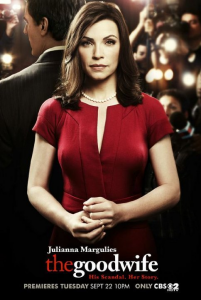tv review: the good wife, season six
The Good Wife, as it proved even in its earliest seasons, houses some of television’s best and most complex female characters on television. In the current landscape of television, where women are so often subjected to roles defined by male characters, the show presents dynamic and layered women like Alicia Florrick (Julianna Margulies) and Diane Lockhart (Christine Baranski), characters whose emotional arcs often follow their desire to be noble and moral people in a world where these ideals are becoming increasingly archaic.
In its fifth season, The Good Wife became the best drama on television. Its fifth episode, entitled “Hitting the Fan,” disassembled the show’s entire premise with its main character Alicia leaving Lockhart Gardner, the firm that had served as a setting for the show up to this point, to start her own. While this sort of structural rupture would derail most shows, The Good Wife took this changes and crafted its best season yet.
The show’s sixth season seems intent on continuing this streak. Ten minutes into its premiere episode, Cary Agos (Matt Czuchry) is arrested and taken to prison. For a show that unexpectedly killed out one of its most beloved characters in the middle of its most monumental season, it’s hard to imagine being shocked by any plot this show throws at the viewer. Cary’s arrest does this. It’s unexpected, but the audaciousness the show has for introducing this storyline so early into its premiere makes it seem even more so. It’s this sort of ambitious and unpredictable writing that helps The Good Wife stand out as the best amongst the glut of prestige dramas currently on television.
While many of its first few episodes have revolved around Cary’s arrest, the season has shifted its focus to Alicia’s campaign for State’s Attorney. After repeatedly turning down offers to run from Eli Gold (Alan Cumming), the Governor’s Chief of Staff, Alicia finally relents after she learns that the current State’s Attorney is only persecuting Cary to get to Lemond Bishop.
Morally corrupt characters are pretty much commonplace now, with shows like Breaking Bad and Game of Thrones, but The Good Wife presents this idea with a slow-burning elegance. These characters don’t break the law, but rather manoeuvre around it and attempt to manipulate it. There’s an etiquette and decorum to these characters’ actions that feels at once refreshing, intelligent and supremely entertaining.
This idea has also come to define Alicia Florrick’s arc on the show. After standing by her husband, Peter Florrick (Chris Noth), when he became the subject of a political scandal, she eventually returned to the law career she pursued before her marriage. Over the course of the show, Alicia has regained her foothold in the legal world, learning quickly how far she’s willing to bend her morals in order to win a case or keep a client. As Eli Gold says when summarising the public’s perception of her, she is still “Saint Alicia,” but she’s smarter, more ambitious and jaded than this label would ever reveal.
After a monumental year, it would have been easy for the show to slow down in its sixth season, to focus on the case-of-the-week format that defined earlier seasons rather than the serialised storytelling prevalent in its later years. But the show is far too ambitious for this. Instead, it continues to maintain an impossible, electric energy. The Good Wife is often a cynical show, with jaded views on everything from politics to business to marriage. On most shows, this would be exhausting, but here it’s thrilling, authentic and unmatched anywhere else on television.


